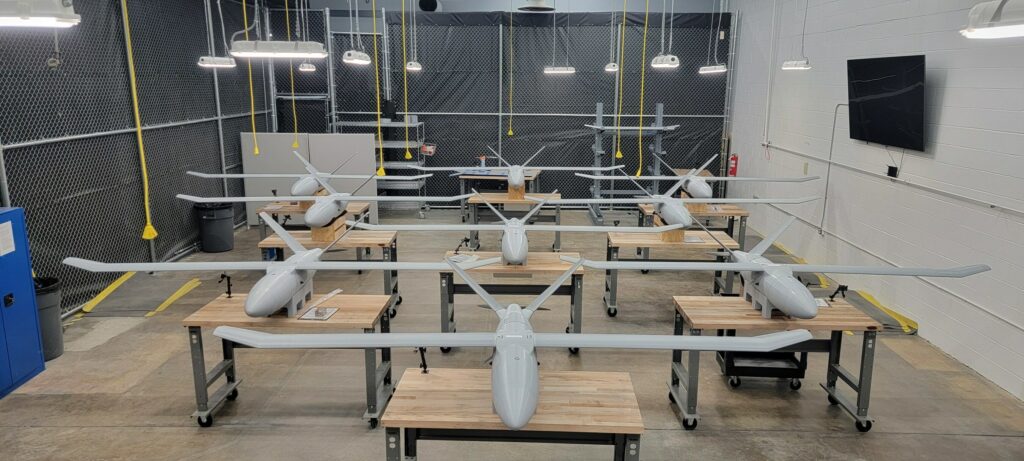
RapidFlight’s additive manufacturing is said to enable production of thousands of unmanned aerial systems that meet Replicator requirements. Nine E2 aircraft are displayed here on the production line. (Photo courtesy RapidFlight/PRNewswire).
RapidFlight’s additive manufacturing process is reported to enable mission-customizable drone design, scalability, and production at the tactical edge.
MANASSAS, Va.—RapidFlight is working with the United States Department of Defense (DoD) in support of the Replicator initiative, which outlines the DoD’s plan to field thousands of autonomous systems across multiple warfighting domains, according to a release from the company.
RapidFlight, an integrated designer and mass manufacturer of unmanned aerial systems (UAS), is intent on addressing the dynamic challenges and stringent timelines critical to national security. The company describes itself as a “commercial-ready, digital drone design, and manufacturing company capable of producing thousands of customized, low-cost, mission-ready, unmanned systems, both centrally and at the tactical edge.” Additive manufacturing enables this capability, according to the release.
Following a demonstration at Technology Readiness Experimentation 2023 (TREX23-2) in Camp Atterbury, Indiana, last year, RapidFlight has “solidified its position as an industry leader by successfully demonstrating the company’s ability to print, assemble, and fly long-range, high-payload unmanned aerial in support of the Replicator Initiative,” the company said in the release.
Supporting this ability are RapidFlight’s digital, additive manufacturing capabilities and expertise in delivering reliable, mission-ready unmanned aerial systems produced at speed and scale.
Referencing the company’s expertise in modular design and digital mass manufacturing, RapidFlight said it is “immediately capable of producing and delivering thousands of UAVs to the DoD and foreign allies with as little as six weeks of lead time.” The aircraft are designed and built with reconfigurable payloads that ae said to meet a range of mission needs, including ISR, EW, kinetic, and swarm, among others.
“RapidFlight exists to enable the DoD and its allies to flexibly respond to urgent and evolving threats posed by strategic global competitors,” said Mike Uffelman, RapidFlight’s director of customer programs, in the release. “Our technology stack, ready for full commercial deployment, enables mission-customizable drone design, scalability, build-anywhere manufacturing, shorter design-to-delivery time, and reduced system costs by up to 80 percent versus existing solutions.”
RapidFlight’s unmanned aerial systems, including the versatile E2 UAS, are reported to increase mission capability by three to five times when compared to the cost of existing systems in the market. The company’s Group 2 and Group 3 electric, gasoline, heavy fuel, and hydrogen aircraft are supported by advanced intelligence, surveillance, and reconnaissance (ISR) payloads and communication systems.
“RapidFlight offers a comprehensive suite of capabilities designed to enhance situational awareness, operational flexibility, and mission effectiveness in contested environments,” the company said in the release. Through its advanced digital design and manufacturing processes, called AgileAviation, and experienced team of industry professionals, RapidFlight said it is “setting new standards in aircraft customization and mass manufacturing.”
